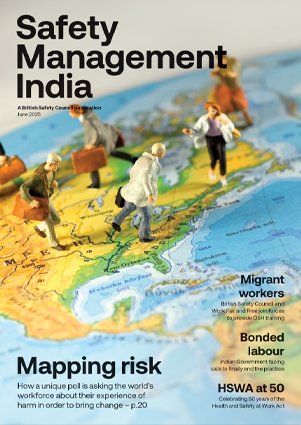A stonemasonry firm has received a fine of almost £20,000 for failing to protect workers from silica dust, as the Health and Safety Executive (HSE) issued new advice for stone worktop installers amid continued calls for engineered stone to be banned over its links to silicosis.
News
Stonemason fined for exposing workers to silica dust as HSE updates advice for stone worktop installers
Doncaster-based Warmsworth Stone Limited, which makes carved stone masonry products from limestone, sandstone, granite and marble, “repeatedly” failed to protect workers from exposure to Respirable Crystalline Silica (RSC), said HSE, which inspected the company’s site a number of times from May 2023.
 Photograph: iStock/cagkansayin
Photograph: iStock/cagkansayin
The regulator served Warmsworth Stone with seven improvement notices – five of which had not been adhered to by the time HSE inspectors visited again in September 2023. HSE said the company had shown “reckless disregard” for guidelines related to the assessment and control of respirable dust.
“The company failed to take the initiative in health and safety matters and seek guidance, instruction and competent advice on implementation and communication of those measures necessary to control the risks at the site,” said HSE inspector Charlotte Bligh. “The provision of suitable protection for workers’ health is a basic requirement that this company has failed to meet.”
Warmsworth Stone pleaded guilty to breaching section 21 of Health and Safety at Work Act 1974 by failing to comply with an Improvement Notice, breaching Regulation 7(1) of the Control of Substances Hazardous to Health Regulations 2002 by failing to adequately control employee exposure to a substance hazardous to health, namely RCS, and breaching Regulation 9(2)(a) the same Regulations by failing to have local exhaust ventilation subject to a thorough examination and test at least every 14 months.
The company was fined £18,000 and ordered to pay costs of £4,064. Director Simon Jonathan Frith was fined an additional £1,062 d ordered to pay £3,782 in costs.
It comes as HSE issued new, simplified advice on how to protect workers from exposure to stone dust and prevent them from breathing in RCS while cutting stone – including engineered stone. Over time, inhaling silica particles can cause deadly lung diseases such as silicosis, chronic obstructive pulmonary disease (COPD) and lung cancer.
Steps to minimise the risk of exposure include using prefabricated worktops that do not need to be processed on-site, using water suppression and dust collectors, and providing workers with adequate respiratory protection equipment, such as FFP3 face masks.
The advice comes amid growing calls to ban engineered stone in the UK. The material has already been banned in California and Australia. Writing in Safety Management in August 2024, Baroness Bennett of Manor Castle (Natalie Bennett) – a Green Party peer in the House of Lords who sits on the All-Party Parliamentary Group for Respiratory Health – called for a ban on new engineered stone worktops and for silicosis to be made a reportable disease. Engineered stone has a much higher silica content than granite and marble.
Clinicians at the Royal Brompton Hospital in London warned about the dangers of silica exposure and called for artificial stone to be banned in a study published last year in the Thorax journal. The warning came after doctors at the hospital began treating the first identified cases of silicosis caused by working with engineered stone in the UK.
Phil Pinnington, head of audit and consultancy at British Safety Council, said that, given the continuing concerns about the dangers associated with exposure to RCS, “it’s right to consider all options to reduce risks and keep workers both safe and healthy”. But he emphasised the importance of careful consideration when deciding whether a ban is the right approach.
“From an Australian-style outright ban to the role of Government-led awareness and education campaigns, decision-makers need to consider all possible ramifications of policy change, given the significant consumer demand that exists for engineered stone, marble and granite,” said Pinnington.
“As Parliament and the APPG on Respiratory Health consider future legislative action, it’s important to explore whether an outright manufacturing ban is the right solution, or whether this would merely move the problem overseas, exposing workers in countries without adequate regulatory protections to an increased risk of harm.”
Domestic education and awareness campaigns have “proved themselves invaluable in reducing workplace risks”, added Pinnington, and when paired with a strong enforcement regime by HSE, they have led to “proactive risk awareness and encouraged measures to alleviate the risk to workers”.
At its core, he said, “any decision must keep the workers of the future safer and healthier”.
According to Kevin Bampton, chief executive of the British Occupational Hygiene Society, bans can be “problematic” because they are “very hard to implement successfully”. In an article for Safety Management in September, Bampton wrote: “Further research should be undertaken urgently to understand whether there are specific properties of engineered stone which create additional risk.
“Restricting the demand and supply of high silica materials should provide the economic stimulus to encourage alternative products and start the gradual process of reducing the huge health burden created by our age-old love of silica-based products.”


NEWS

Karnataka passes law granting employment and social security rights to app-based gig workers
By Orchie Bandyopadhyay on 11 June 2025
App-based gig workers in Karnataka state will shortly gain new employment rights and access to certain social security benefits after the state governor formally gave assent to an ordinance, or law, aimed at ensuring the welfare of platform-based workers.

